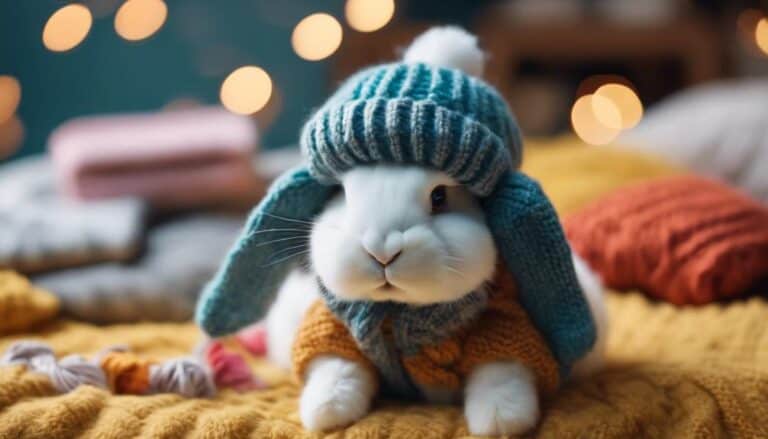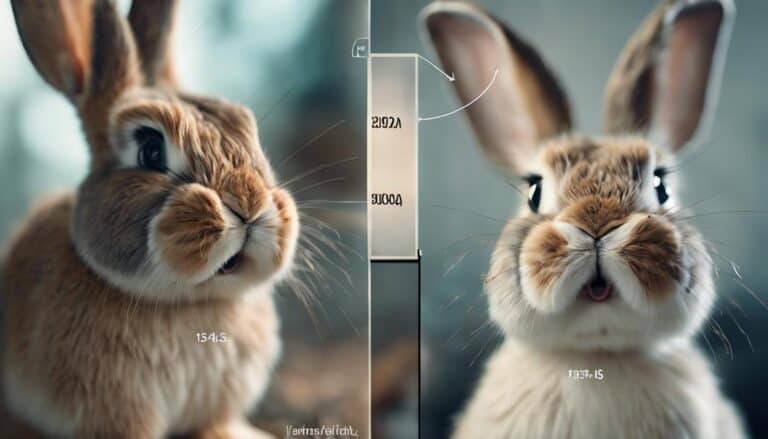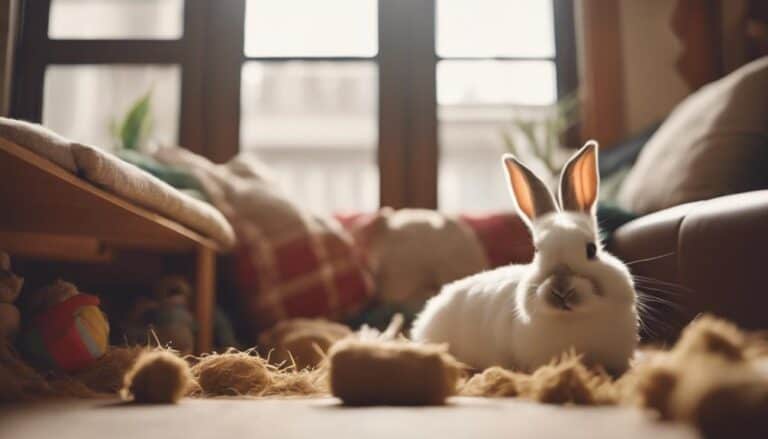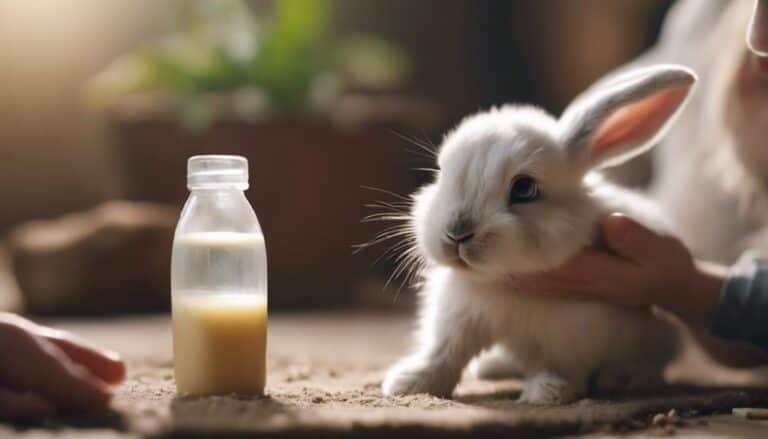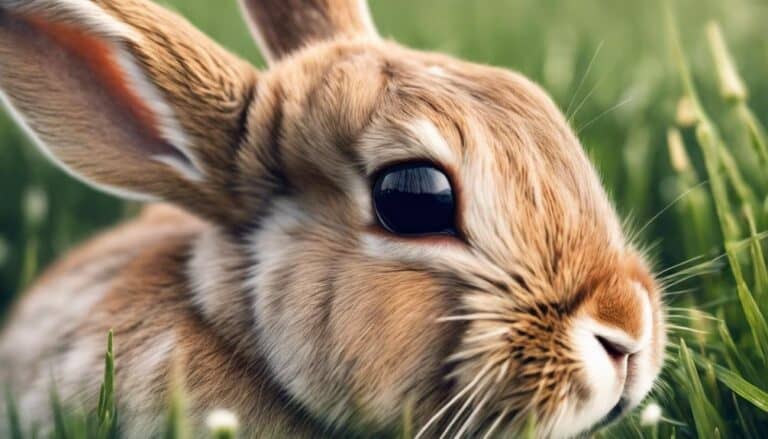If you've ever wondered about the lifespan of a rabbit, you're not alone. There are several factors that come into play when determining how long your furry friend may live. Genetics, diet, and living conditions all play a vital role.
Genetics can have a significant impact on a rabbit's lifespan. Some breeds are naturally longer-lived than others. For instance, larger breeds like the French Lop or the Flemish Giant can live up to 10-12 years, while smaller breeds like the Polish or the Netherland Dwarf may only live for 7-9 years.
Diet is another crucial factor. Rabbits that eat a high-quality pellet diet supplemented with fresh veggies and fruits tend to live longer than those who don't. A diet that's too high in sugar or fat can lead to obesity and other health problems, which can shorten a rabbit's lifespan.
Living conditions also play a significant role. Rabbits that live in clean, spacious cages with plenty of hiding places and toys tend to be less stressed and live longer than those who don't. Stress can weaken a rabbit's immune system, making them more susceptible to disease.
To help your rabbit live a long and healthy life, make sure you're providing a high-quality diet. Fresh water and hay should always be available, and veggies and fruits should be introduced gradually to prevent digestive upset. Keep their cage clean and spacious, and make sure they have plenty of hiding places and toys to keep them stimulated. Finally, make sure your rabbit gets regular check-ups with a vet to catch any health problems early on.
Contents
- 1 Key Takeaways
- 2 Factors Affecting Rabbit Lifespan
- 3 Breed and Genetics Influence
- 4 Impact of Diet on Longevity
- 5 Gender Differences in Lifespan
- 6 Role of Living Conditions
- 7 Importance of Healthcare
- 8 Extending Rabbit Lifespan
- 9 Larger Vs. Smaller Breeds
- 10 Promoting Long and Healthy Life
- 11 Maximizing Rabbit's Lifespan
- 12 Conclusion
Key Takeaways
So, how long do rabbits live? Well, with proper care, a rabbit can live for 8-12 years. But, their lifespan can vary depending on a few factors, like their genetics, diet, and environment.
Regular vet check-ups and a balanced diet can really promote a longer life. It's also important to know that larger breeds tend to have shorter lifespans compared to smaller breeds. And, did you know that spaying or neutering your rabbit can add 2-3 years to their life?
Factors Affecting Rabbit Lifespan
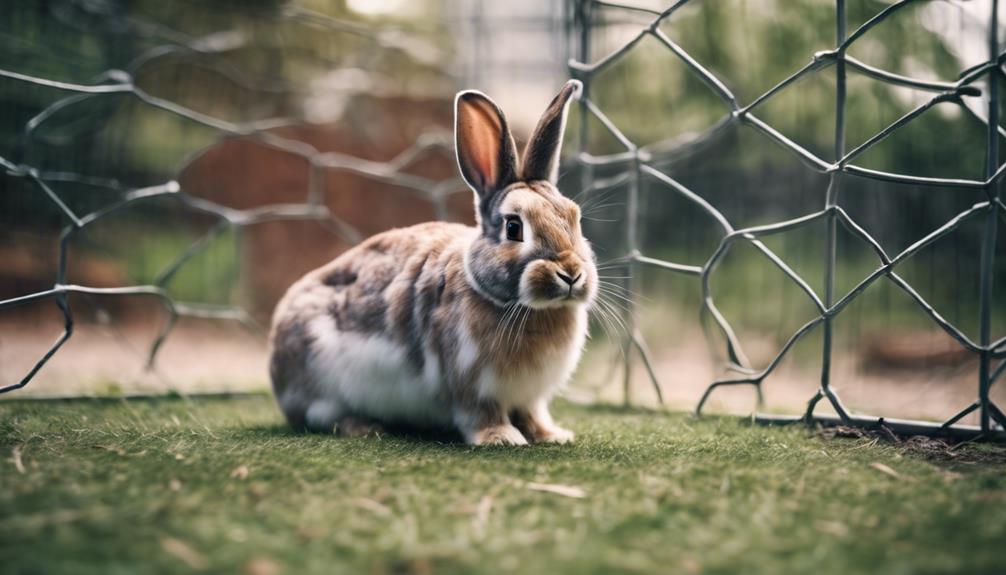
So, what affects how long a rabbit lives? Well, it's a combination of genetics, diet, environment, and the characteristics of their breed. All these factors play a crucial role in determining a rabbit's lifespan.
First and foremost, a rabbit's diet is essential for their wellbeing. They need a high-fiber diet with limited sugar intake to stay healthy and live a long life. It's also vital to provide them with regular access to food and safe places to hide, which contributes to their overall wellbeing and can even extend their lifespan.
On average, domestic rabbits live between 8-12 years if they receive proper care and live in a safe environment. Regular veterinary check-ups and attentive care can further increase their lifespan, with some rabbits living up to 11, 12, or even older.
Now, the characteristics of a rabbit's breed also play a significant role in determining their lifespan. For instance, larger breeds like Flemish Giants tend to have shorter lifespans compared to smaller breeds like Netherland Dwarfs. So, understanding these factors and providing care tailored to a rabbit's specific needs can greatly impact their health and how long they live.
Breed and Genetics Influence
So, when it comes to rabbit breeds, size really does matter – at least when it comes to how long they live.
Larger breeds tend to have shorter lifespans compared to smaller ones, and that's mostly due to genetic factors.
One interesting thing to consider is that purebred rabbits usually don't live as long as mixed breeds.
This really drives home the point that genetics play a big role in determining how long a rabbit will live.
When you're trying to figure out how long your rabbit will live, it's essential to think about their breed and genetic predispositions.
Genetic Factors Impact
Genetic factors have a significant impact on a rabbit's lifespan. The breed of a rabbit and its genetic makeup play a vital role in determining how long it will live. Generally, larger breeds and purebreds tend to have shorter lifespans compared to smaller breeds and mixed breeds.
Larger rabbit breeds, for instance, have an average lifespan of 7-10 years. On the other hand, smaller breeds can live up to 10-12 years. Similarly, purebred rabbits tend to have shorter lifespans, averaging 7-10 years, whereas mixed breeds can live longer, up to 10-12 years.
While genetic factors are important, they only account for about 10-20% of a rabbit's overall lifespan. Nutrition and exercise, for example, play a much more significant role in determining how long a rabbit will live. Additionally, rabbits with a family history of certain health issues, such as uterine cancer, may have a shorter lifespan due to genetic predispositions.
Researchers are working to better understand the specific genetic factors that influence rabbit longevity. Ongoing research in Rabbit Medicine aims to shed more light on this topic.
Here's a breakdown of how different factors impact a rabbit's lifespan:
| Factors | Impact on Lifespan |
|---|---|
| Larger Breeds | Shorter lifespan (7-10 years) |
| Smaller Breeds | Longer lifespan (10-12 years) |
| Purebred Rabbits | Shorter lifespan (7-10 years) |
| Mixed Breeds | Longer lifespan (10-12 years) |
| Genetic Factors | 10-20% of overall lifespan |
Breed-Specific Longevity Factors
So, the size of the breed plays a big role in how long a rabbit will live. Generally, smaller breeds tend to live longer than larger ones.
On average, larger rabbit breeds live for around 7-10 years, while smaller breeds can live for 10-12 years. That's quite a difference!
Genetics also play a part in this. For example, purebred rabbits tend to have shorter lifespans, typically living for 7-10 years, whereas mixed breeds can live for 10-12 years.
The Flemish Giant rabbit is a larger breed, and as you'd expect, its average lifespan is on the shorter side, at around 7-8 years.
On the other hand, the Netherland Dwarf rabbit is a smaller breed, and it boasts an impressive average lifespan of 10-12 years, making it one of the longer-lived small breeds.
Impact of Diet on Longevity
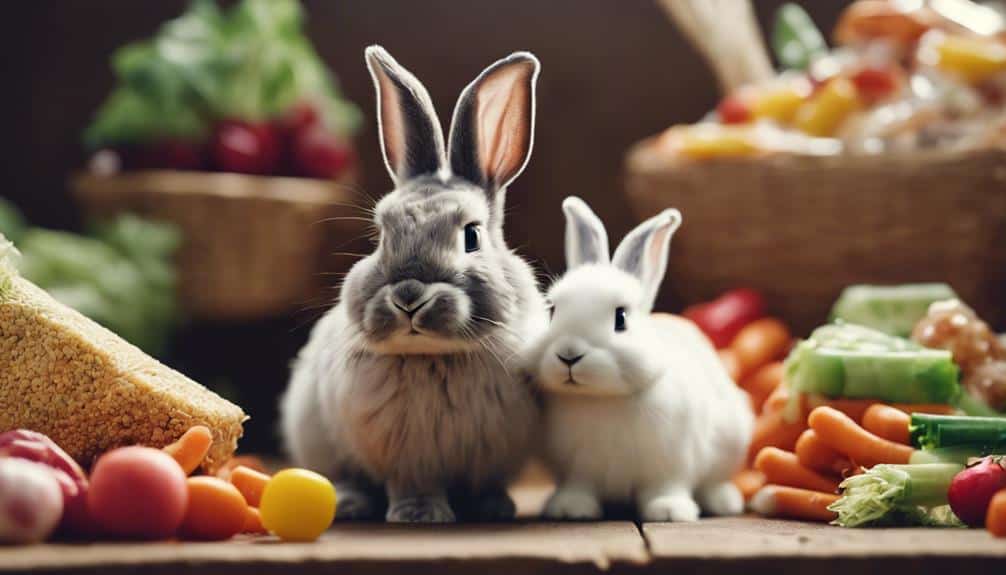
When it comes to ensuring a rabbit lives a long and healthy life, their diet plays a crucial role. A good diet is essential for a rabbit's overall health and well-being.
In terms of specifics, rabbits need certain foods to thrive. They require clean timothy hay or dried grass, fresh leafy greens, and high-fiber pellets. These foods are vital because they help keep the rabbit's digestive and dental health in top shape.
This, in turn, reduces the risk of obesity and related health problems.
It's worth noting that a rabbit's diet has a bigger impact on their lifespan than their genetics. So, it's crucial to feed them a balanced diet that supports their overall health.
Different stages of a rabbit's life, such as when they're young or old, may require different diets to ensure they're getting the right nutrients.
Gender Differences in Lifespan
When it comes to rabbits, there's a pretty interesting difference in how long males and females tend to live.
Male rabbits, or bucks, usually live for around 7 to 10 years. Female rabbits, on the other hand, known as does, can live for 8 to 12 years.
One reason bucks tend to have shorter lives is because they can be pretty aggressive and territorial. This behavior can affect their health and, ultimately, how long they live.
In contrast, does seem to live longer, healthier lives.
Understanding these gender differences is really important if you want to give your rabbit the best possible care and help them live a long, happy life.
Male Rabbit Lifespan
Male rabbits, also known as bucks, typically live for 7 to 10 years, but with proper care, some can live up to 12 years or more. Interestingly, male rabbits tend to have a slightly shorter lifespan compared to female rabbits.
So, what affects how long a male rabbit lives? Well, it's a combination of factors, including their breed, genetics, diet, exercise, and overall health. It's essential to keep an eye on these factors to ensure your male rabbit lives a long and healthy life.
Spaying or neutering your male rabbit can also make a big difference. Not only can it prevent health issues like testicular cancer, but it can also contribute to a longer lifespan. So, if you haven't already, consider getting your male rabbit spayed or neutered.
Regular veterinary check-ups are also crucial. By keeping tabs on your male rabbit's health and providing a balanced diet, you can support their overall well-being and potentially extend their lifespan. It's vital to prioritize these aspects of care to give your male rabbit the best life possible.
When it comes down to it, providing proper care, a safe environment, and a balanced diet are essential for maximizing your male rabbit's lifespan. By taking these aspects into account, you can help your male rabbit live a longer, healthier life.
Female Rabbit Lifespan
Female rabbits, also known as does, usually live longer than male rabbits. On average, they live for 9-12 years, while males typically live for 7-10 years. This means you can expect your female rabbit to be a long-term companion and bring you joy for many years.
One key thing to keep in mind is spaying your female rabbit. This can greatly extend her lifespan by preventing uterine cancer, a common health issue in unspayed females. Research shows that female rabbits spayed before their first heat cycle have a lower risk of uterine cancer and can potentially live up to 15 years or more. On the other hand, unspayed female rabbits are more likely to get uterine cancer, which can significantly shorten their lifespan.
In addition to spaying, providing proper care is also crucial in promoting a longer and happier life for your female rabbit. This includes regular veterinary check-ups, a balanced diet, and a safe living environment. By taking these steps, you can help ensure your female rabbit lives a long and happy life.
Lifespan Variations by Gender
When it comes to rabbits, their lifespan varies depending on their gender. Male rabbits, also known as bucks, tend to live shorter lives compared to female rabbits, or does.
On average, male rabbits live for 7-10 years, while females typically live for 8-12 years. However, if you spay or neuter your rabbit, it can add 2-3 years to their lifespan. This is true for both male and female rabbits.
If you don't spay or neuter your rabbit, the average lifespan is different. Intact male rabbits live for around 5-7 years, while intact females live for about 6-8 years. Research has also shown that female rabbits tend to outlive males in many breeds, with some breeds having a difference of up to 2-3 years in average lifespan between the sexes.
Understanding these differences in lifespan can help you make informed decisions about how to care for your rabbit and how long they might live.
Role of Living Conditions
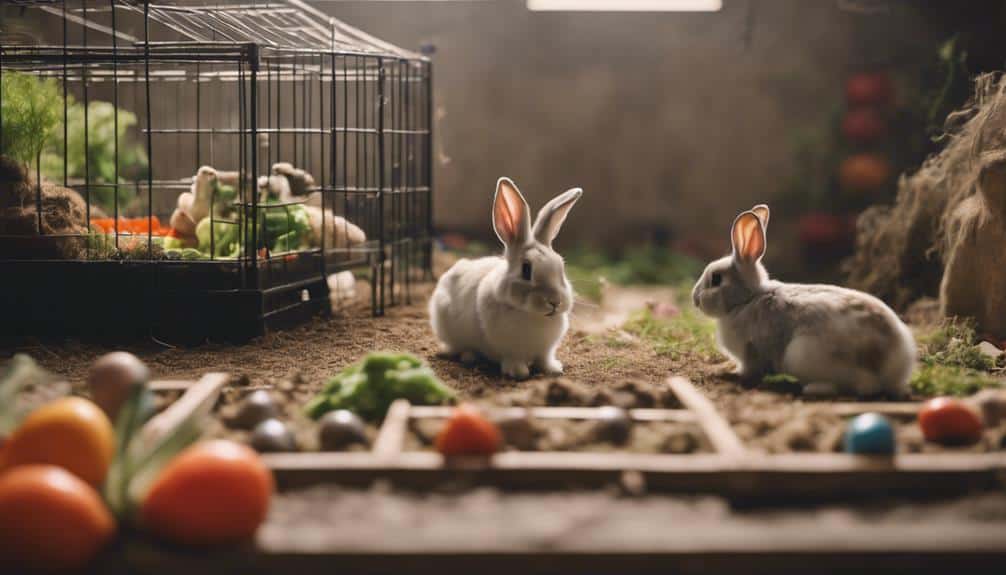
The living conditions of a rabbit are super important when it comes to their overall health and lifespan. As a responsible pet owner, you want to create an environment that makes them happy and healthy. Rabbits love having plenty of space to move around and explore, so they need a roomy area with good airflow.
If you don't provide the right living conditions, your rabbit can develop some common health problems. For instance, if they don't get enough exercise and eat too much, they can become obese. This can really shorten their lifespan.
Another issue is dental problems, which can happen if they don't have enough hay and things to chew on. This can cause them pain and make eating difficult.
Gastrointestinal stasis is another problem that can occur if your rabbit is stressed or doesn't eat a balanced diet. This is when their digestive system slows down, and it can be serious.
Importance of Healthcare
Maintaining your rabbit's health is crucial for a long and happy life. Regular veterinary check-ups are a must. These appointments aren't just routine; they help identify any health problems early on, allowing for prompt treatment and preventing conditions from worsening.
When it comes to keeping your rabbit healthy, preventive care is also key. Annual vaccinations are crucial to prevent illnesses and diseases that could significantly impact your rabbit's health and overall well-being.
A clean environment is essential for your rabbit's health. Regular cleaning of their living area can prevent health issues caused by bacteria or parasites. A clean environment is vital.
Monitoring your rabbit's behavior is also crucial. Be attentive to your rabbit's behavior and watch for signs of illness or stress. Early detection of health problems can lead to more effective treatment and a better prognosis for your furry friend.
Proactive healthcare measures can help maintain a healthy and happy life for your beloved rabbit.
Extending Rabbit Lifespan
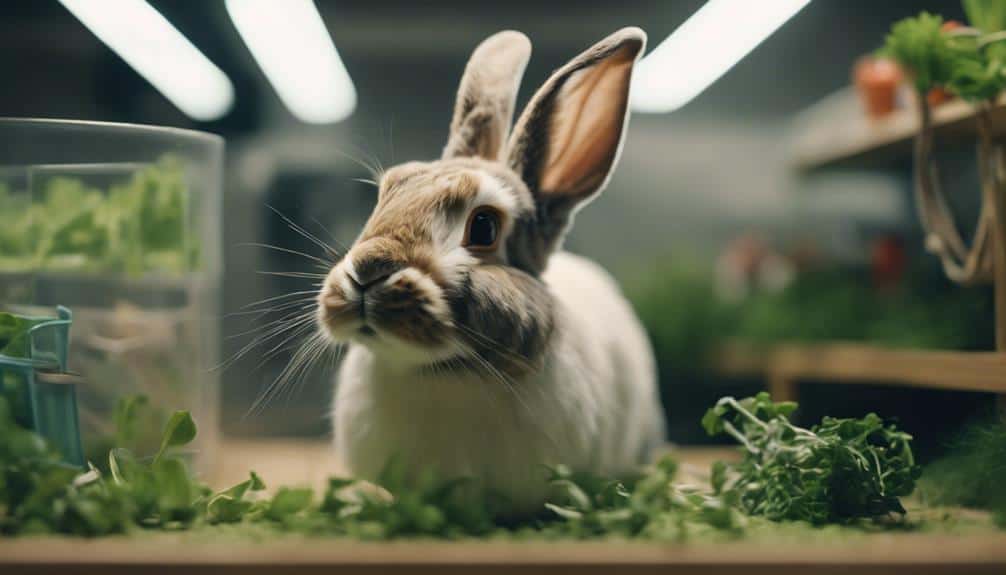
So, you want to make sure your rabbit lives a long and happy life, right?
To do that, you need to focus on a few key things.
First, nutrition is crucial. Rabbits can live for 8-12 years if they're fed the right stuff. A good diet is essential for a long, healthy life. You should give your rabbit clean timothy hay or dried grass, as well as fresh, leafy greens every day.
Next up, exercise is vital. Rabbits need to move around to stay healthy, so make sure they've got a safe environment to do that in. A clean cage with plenty of space is a must. Genetics do play a role in how long your rabbit will live, but it's smaller compared to nutrition and exercise.
Regular veterinary check-ups are also super important. They can help catch any health issues early on, which makes a big difference. Spaying or neutering your rabbit can also prevent a bunch of health problems. And don't forget about vaccinations – they're necessary to keep your rabbit safe from illnesses and diseases.
Lastly, keep an eye out for any changes in your rabbit's behavior or signs of stress. If you catch these things early, you can make a real difference in your rabbit's overall health and longevity.
Larger Vs. Smaller Breeds
When thinking about how long your rabbit will live, remember that bigger breeds tend to have shorter lifespans compared to smaller ones.
This difference is due to several factors like genetics, what they eat, and how much they exercise.
Understanding the differences between bigger and smaller breeds can help you give your rabbit the right care to live a longer, healthier life.
Size Impacts Rabbit Lifespan
The size of a rabbit breed affects its lifespan. Larger breeds tend to have shorter lifespans compared to smaller breeds. This is often due to genetic predispositions and health risks associated with their size.
For instance, larger rabbit breeds like the Flemish Giant typically live for around 7-8 years, whereas smaller breeds like the Netherland Dwarf can live up to 12-14 years. Research suggests that larger breeds are more prone to health issues like obesity and heart problems, which can contribute to their shorter lifespans.
Smaller rabbit breeds are usually more energetic and agile, with lower rates of health concerns. This means they tend to live longer.
However, it’s essential to remember that while size plays a role in a rabbit’s lifespan, other factors like genetics, diet, and exercise are equally important in determining how long a rabbit will live. Additionally, providing the right environment and regular veterinary care can significantly influence a rabbit’s overall health and longevity. Owners should also be aware that some may try to determine pet age by weight, which can sometimes offer a rough estimate, but it is not always a reliable method. Ultimately, a holistic approach that considers all these factors will lead to a happier and longer life for your furry friend.
Health Considerations in Breeds
When it comes to the lifespan of rabbits, size really does matter. Larger breeds, like Flemish Giants, typically live for 7-10 years, while smaller breeds, like Netherland Dwarfs, can live up to 12-15 years.
But why is that? Well, it's because larger breeds grow so fast that they're more prone to health issues like arthritis and heart problems, which can shorten their lifespan.
On the other hand, smaller breeds tend to live longer because they grow at a slower rate and are less likely to develop these health problems. But it's not just about size – breed genetics also play a big role in determining how long a rabbit will live. Some breeds are more prone to certain health issues, which can affect their lifespan.
Care Differences for Breeds
When it comes to caring for larger and smaller rabbit breeds, there are some key differences to keep in mind. These differences can really impact their overall health and lifespan.
Larger breeds need a diet with lower caloric density to prevent obesity and related health issues. On the other hand, smaller breeds need more frequent feedings to maintain their energy levels and prevent weight loss.
When it comes to exercise, larger rabbit breeds need more space to move around and exercise to prevent obesity and muscle atrophy. Smaller breeds, on the other hand, can thrive in smaller living environments, but they still benefit from regular playtime and stimulation.
Health monitoring is also important. Larger breeds need more frequent check-ups to monitor for early signs of cardiac disease or joint problems. Smaller breeds, on the other hand, can benefit from regular dental checks to prevent dental issues commonly seen in small breeds.
Promoting Long and Healthy Life
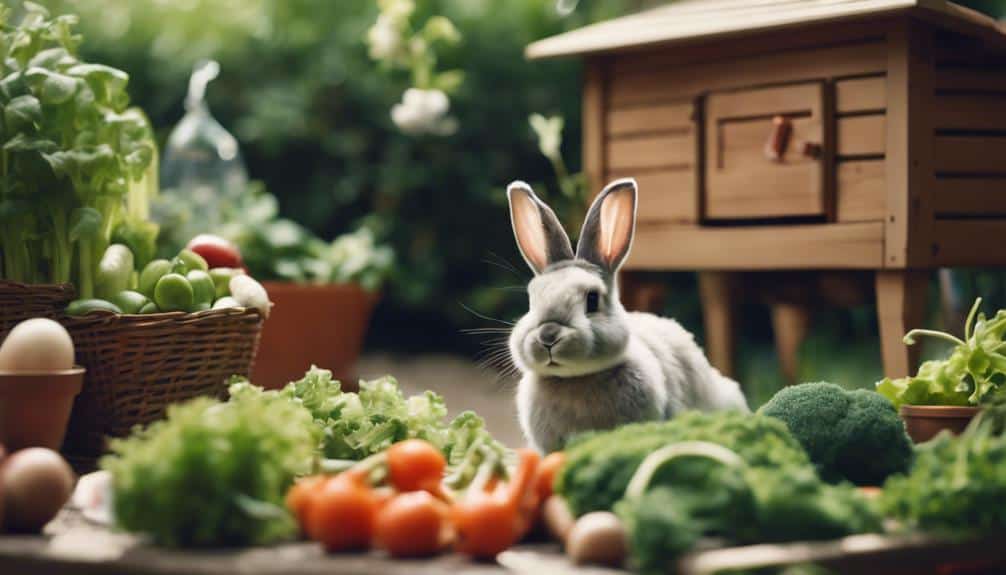
Want to ensure your rabbit lives a long and healthy life? It all comes down to providing the right environment, a balanced diet, regular exercise, and preventive healthcare measures.
Different rabbit breeds have unique needs, so it's crucial to understand your rabbit's breed characteristics for their well-being. For instance, keeping your rabbit indoors can protect them from predators, extreme weather, and diseases like Rabbit Hemorrhagic Disease Virus.
Regular veterinary check-ups and spaying female rabbits can greatly extend their lifespan by preventing health issues such as uterine cancer. Additionally, providing enrichment activities like varied hays, toys, and mental stimulation can prevent boredom and stress, contributing to a long and healthy life.
Maintaining a clean and safe living space is vital, along with annual vaccinations to prevent illnesses. Daily social interactions and exercise are essential components in promoting a happy and healthy life for your furry companion.
Maximizing Rabbit's Lifespan
So, you want to maximize your rabbit's lifespan? It all comes down to providing proper nutrition, regular exercise, and timely veterinary care. When you get these basics right, you're setting your furry friend up for a happy and healthy life.
A nutritious diet is essential. You want to offer a balanced mix of clean timothy hay, fresh leafy greens, and high-fiber rabbit pellets. And don't overdo it – rabbits don't need a lot of food, and overfeeding can lead to problems. Make sure they always have access to clean water, too.
Your rabbit needs regular exercise. These little guys are meant to move, so give them the space to hop around and explore. You can also use interactive toys and tunnels to keep them active and engaged.
Timely veterinary care is also crucial. You want to schedule regular check-ups with a vet who knows their stuff when it comes to rabbits. This way, you can catch any potential issues early on and get them treated before they become serious problems.
As your rabbit gets older, they'll need some extra TLC. Special care for senior rabbits means adjusting their diet and exercise routine to meet their changing needs. Give them a little extra comfort and attention, and they'll be happy and content in their golden years.
When you get these basics right, you're giving your rabbit the best chance at a long and happy life. So, focus on nutrition, exercise, and veterinary care, and you'll be well on your way to creating a happy and healthy life for your furry friend.
Conclusion
So, you want to give your rabbit the best life possible.
To do that, make sure they've a big enough space to live, eat a healthy diet, and get regular check-ups at the vet.
When you take good care of your rabbit, they'll be happy and healthy. It's kind of like a garden – if you take care of it, it will bloom.
By paying attention to your rabbit's physical and emotional needs, you can help them live a long and happy life.
They'll be full of energy and joy, and you'll get to see them thrive.
This will help them stay healthy and happy, and they'll be able to make the most of their life.

